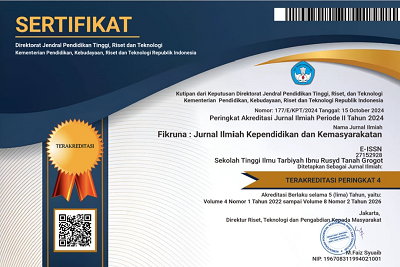DIALEKTIKA FILOSOFIS IBN SINA DAN ARISTOTELES MENELUSURI FONDASI EPISTEMOLOGIS DALAM TEORI KOMUNIKASI LINTAS BUDAYA ISLAM-YUNANI
Abstract
This study examines the philosophical interaction between Ibn Sina and Aristotle within the framework of the theory of cross-cultural communication between Islam and Greece. By applying qualitative methods and text analysis, this study seeks to identify the epistemological foundations that underpin the thinking of the two philosophers, as well as explore the application of their ideas in the context of intercultural communication. Ibn Sina, known as Avicenna among Western thinkers, not only adopted but also enriched Aristotle's thought with an Islamic perspective, resulting in a distinctive synthesis between Greek philosophy and Islamic theology. This research emphasizes the importance of logic, ethics, and metaphysics in creating bridges of understanding between two different cultural traditions. Through in-depth analysis, this study shows how the concepts carried by the two philosophers can contribute to facing today's global communication challenges, including cultural pluralism and interreligious dialogue. Thus, this research focuses not only on the theoretical aspects, but also on the practical application of their thinking in the modern context. The findings of this study indicate that the philosophical dialogue between Ibn Sina and Aristotle contributed significantly to a broader epistemological understanding. In addition, the approach resulting from the interaction of their thoughts offers a deeper perspective in understanding the dynamics of cross-cultural communication. Thus, this study has the potential to enrich academic discourse on the relationship between philosophy and communication practice in an increasingly complex and diverse context.
References
Aristoteles, Mehmet H. Do?an, Retorik (Istanbul: YKY, 2006)
Corbin, Henry, History of Islamic Philosophy (London: THE INSTITUTE OF ISMAILI STUDIES, 2014)
Creswell John and Creswell David, Research Design, Qualitative, Quantitative and Mixed Methods Approaches, SAGE Publications,Inc. (Los Angeles: Sage Publications, 2023), Sixth Edit
Daiber, Hans, and Helga Daiber, �God�s Wisdom to Science A. Islamic Theology and Sufism B. History of Science�, Islamic Philosophy, Theology and Science: Texts and Studies, 114 (2021), 3�24
Erasmus, Jacobus, The Kalam Cosmological Argument: A Reassessment (London and New York: Springer, 2018)
Foster Cohen, Susan H., Relevance: Communication and Cognition, Second Language Research (Oxford: Blackwell, 1995), xvi
Georges Tamer, Islamic Philosophy and the Crisis of Modernity (New York: Suny Press, 2024)
Gleave, Robert M., Scripturalist Islam: The History and Doctrines of the Akhbari Shi�i School (Islamic Philosophy, Theology, and Science), Brill, 2007
Gudykunst, William B., Theorizing About Intercultural Communication (CALIFORNIA: Sage Publications, 2005)
Heidemann, Stefan, and Gottfried Hagen, Studies in the History and Culture of the Middle East Volume 31 (Boston: Walter de Gruyter GmbH, 2016)
Huntington, Samuel P., The Clash of Civilizations and the Remaking of World Order (New York: Simon & Schuster, 1996)
Inati, Shams, Ibn Sina and Mysticism (London and New York: Kegan Paul International, 1996)
Lanigan, Richard L., � General and Theoretical: Beyond Culture . Edward T. Hall �, American Anthropologist, 80.2 (1978), 403�403
Majid Fakhry, A History of Islamic Philosophy, 2004
Nasr, Seyyed Hossein, SCIENCE AND CIVILIZATION IN ISLAitI, Development (Chicago: ABC International Group, Inc, 2001), cxxxiv OK, Hanum Azizah, �Analisis Pemikiran Ibnu Sina Dan Ibnu Khaldun Terhadap Konsep Pendidikan Islam�, Edukasi Islami: Jurnal Pendidikan Islam, 10.2 (2021), 1�18
Politis, Vasilis, Aristotle and the Metaphysics �This (London and New York: Routledge, 2004)
Rizvi, Sajjad H., �Avicenna (Ibn Sina) _ Internet Encyclopedia of Philosophy�, Internet Encyclopedia of Philosophy, 2017
Ross, W. D., �NICOMACHEAN ETHICS�, The Modern Schoolman, 66.1 (1988), 79�80
Sumartono, �Model Dan Teori Komunikasi�, Pengantar Ilmu Komunikasi, Bagian 1, 2022, 1�16
TINA, AGUS, �Revolusi Etika Politik Teori Filsafat Kontemporer Terhadap Konsep Etika Ibn Sina�, Jurnal Siginjai, 3.1 (2023), 50�65
Wahda, Nur Aqiqah, and Indo Santalia, �Pengaruh Filsafat Yunani Terhadap Pemikiran Islam�, 1.July (2024), 306�12
Wolfson, Harry Austryn, The Philosophy of the Kalam (New York: Harvard University Press, 1976)
Yule, George, Pragmatics, The Cambridge Handbook of Spanish Linguistics (Oxford: Oxford University Press, 1996)
Copyright (c) 2025 Mailin Mailin, Alya Rahmayani Siregar, Iskandar Zulkarnain

This work is licensed under a Creative Commons Attribution-NonCommercial 4.0 International License.



.png)












